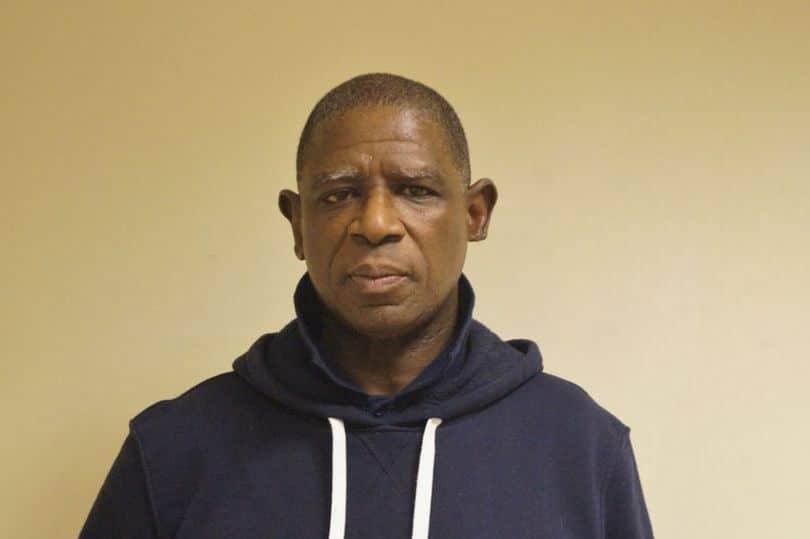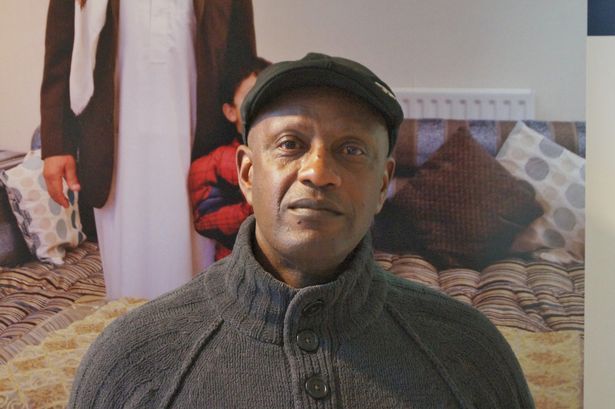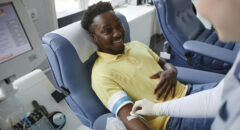
Screening and testing are often thought of as an early prevention method for many diseases. For Black men, who are more likely to be diagnosed with more aggressive forms of prostate cancer at younger ages, the importance of screening is even more evident. Now, one dad is showing just how important it is.
In 2014, 56-year-old Gilly Morgan was undergoing what he thought was a routine check-up. However, the check-up detected increased levels of prostate-specific antigen in his blood indicating that he had prostate cancer.
The fear of prostate exams
Like many men, Morgan was initially hesitant to undergo the prostate exam, which many find invasive and uncomfortable. The test involves a doctor inserting a lubricated, gloved finger up the patient’s rectum to feel the size and texture of the prostate for any irregularities.
"When he said that, I went, 'I've heard about this, I've heard about a finger up the backside! It's a fear factor,” Morgan recalls. "But I said, 'Doctor, go ahead', because obviously something wasn't right. "Those two fingers saved my life. I'm here to this day. Those two fingers saved my life. "I will always repeat that, because what I learned was that a lot of guys are embarrassed."
RELATED: Men: Knowing Your PSA Number May Save Your Life
The importance of regular check-ups
Morgan was initially told that he would have only 36 months to live if he left the prostate cancer untreated. Morgan was ultimately treated and survived, no doubt thanks to his proactiveness about his health. However, he realizes that many men aren’t as fortunate because they simply don’t go to the doctor. Because of this, many men die without knowing they have cancer or any other life-threatening condition.
Sadly, Morgan’s dad was one of those men. Morgan recalls him denying his prostate cancer diagnosis even after he read his medical records.
"He never told me or my brother. In the Black community, and not just in the Black community, but across the board, men in general don't go to the doctors, and they definitely don't talk about issues regarding the penis, if it's not working or whatever,” Morgan shares. "We're too macho for that, and that's why a lot of men die. They're too proud to go and get advice."
The inspiration behind sharing his story
After his diagnosis, Morgan looked for Black men who had prostate cancer and would be willing to give him advice, but had a hard time finding anyone.
Without anyone to speak up about prostate cancer, he decided to share his own story. His childhood friend, Michael Crowe, was shocked to learn he had prostate cancer, but it prompted him to take charge of his own health.

"He was very serious. It was a bit of a shock, but then I just thought, I've got to get my own life in order," Crowe says.
The dad of six was inspired to discuss prostate cancer with his own doctor, who encouraged him to get it checked out. From there he began getting routine prostate exams.
During one of Crowe’s routine prostate biopsies, potentially cancerous cells were detected.
"I thought I was a hard person and I thought, 'I can cope with this', but then there was a point where I was a bit panicky, I think it was the second biopsy, and I thought, 'This must be serious no?',” Crowe adds. "Even though it was an examination just to see all the areas, it was like, 'What if they're going to come back with something?
By this time, Crowe was also using the bathroom more frequently (about four or five times during the day and night), which is one of the many symptoms of prostate cancer.
Ultimately, Crowe was presented with three options. Leave his prostate as it was as the cancer seemed to stabilize, have it treated with chemotherapy, or have it removed entirely.
Crowe choose the latter option and his prostate was removed by robotic arms, which left four nearly invisible, pinprick scars on his stomach.
RELATED: 8 Ways You Can Prevent Prostate Cancer
Raising awareness on prostate cancer
Crowe and Morgan are now on a mission to raise awareness of prostate cancer in the Black community.
Black men in the U.S. are about 60% to 80% more likely to be diagnosed with prostate cancer, and twice as likely to die from prostate cancer compared to men of other races in the U.S, according to the American Cancer Society.
The recommended age for prostate screening is 50, but because Black men are often diagnosed earlier, they are encouraged to begin screening at 45, especially if they have a family history.
A recent study led by researchers from UW Medicine and Fred Hutch Cancer Research Center supports this theory.
“The study provides us evidence to support a personalized screening recommendation for Black men, who are more likely to be diagnosed at younger ages and with more aggressive disease," says Dr. Yaw Nyame, a urologic oncologist at the University of Washington School of Medicine. "We found that screening at age 45 and testing every year until age 70, decreased deaths from prostate cancer compared to current screening practices without increasing the number of over-detected prostate cancer cases."
“The screening between 45 and 70 decreased the likelihood [of] dying by about 30 percent, when compared with no screening at all," he adds.
Prostate cancer often shows no signs or symptoms in its early stages, which is also why screening is so important.
However, in some cases, patients may experience the following:
- Frequent urination
- Weak or interrupted urine flow or the need to strain to empty the bladder
- The urge to urinate frequently at night
- Blood in the urine
- New onset of erectile dysfunction
- Pain or burning during urination, which is much less common
- Discomfort or pain when sitting, caused by an enlarged prostate
If you have any signs or symptoms that worry you or if you want to discuss your risks and the option of screening, consult with your doctor.








